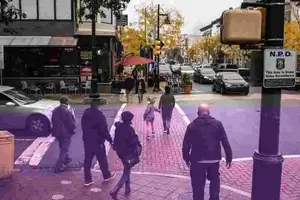
A spike in COVID-19 cases has again put New Jersey on the cusp of imposing restrictions meant to keep the Coronavirus at bay, officials said Friday (Nov 6)as the state saw around 2,000 new infections for a third straight daya bench mark it last crossed in May.
The climbing case counts follow an uptick in the positive test rate in the state, which was an early epicentre of the pandemic.
The statistic, a proxy for the virus's prevalence in the community, stood at 6 per cent this week. The rate was nearly three times what it was in mid-September, and above the 5 per cent figure that public health authorities consider worrisome.
In contrast, officials in New York, which responded similarly to the pandemic's devastating first wave with a strict lockdown, said Friday that its positive rate was around 2 per ccent and being pushed up by so-called hotspots in several regions.
New Jersey, which is more densely populated, has its own hotspots, mainly in the northern and central parts of the state.
Governor Philip Murphy, speaking at a news conference Friday in which the daily statistics were announced, did not specify what measures might be introduced or when, although he did say that action was coming soon.
"We're working on making sure that we've got a right balance between strategic, scalpel-like actions and some broader actions that we will nearly certainly take sooner than afterwards," said Mr Murphy, who had previously shown a reluctance to reimpose sweeping limits on commercial activity.
The governor's comments came a day after he indicated that the rising numbers of cases and virus-related hospitalisations had prompted officials to decide to take steps soon to safeguard public health.
"How close are we to doing something?" Mr Murphy said Thursday. "Close. So bear with us. We will clearly be taking action."
Assistant professor Krystal Pollitt from the Yale School of Public Health said that in states like New Jersey that are experiencing a resurgence of the virus as the weather cools, restrictions that narrowly target areas where positive test rates are especially high can be effective. New York has adopted such an approach.
Beyond that, Assistant Prof Pollitt encouraged people to wear face masks indoors as well as outside to slow the virus's spread. And she suggested that officials and members of the public alike would be wise to focus their attention on enclosed settings like restaurants, gyms and public transit, where ventilation may be lacking and keeping social distance may be difficult.
"Indoor dining is high risk," she said, citing one activity that several people in New Jersey and elsewhere have yearned for a return to as a way of feeling like life is becoming normal again.
The uptick in New Jersey, where the virus is linked to more than 16,000 deaths, has coincided with climbing case counts across the United States. The country recorded at least 121,000 new infections Thursday, a day after hitting 100,000 for the first time since the pandemic began.
Like most states in the North-east, New Jersey made major strides in tamping down the virus after Mr Murphy halted all non-essential activity in March, including closing schools, restaurants, bars and most other businesses. Even state parks were closed for a brief period.
In early summer, with the worst of the first virus wave over, the state began to reopen gradually while maintaining limits on activities like indoor dining and social gatherings. The restrictions upset business owners, who said their livelihoods were being threatened.
In October, several months into the reopening, New Jersey officials began to raise concerns concerning the emergence of another wave when the number of new positive tests doubled in a month, to an average of more than 900 a day.
The health commissioner, Dr Judith Persichilli, said then that officials had begun to see signs of "widespread community spread" for the first time since New Jersey successfully slowed the virus's spread.
The new spike in cases led Mr Murphy, who at one point had indicated a desire to loosen a 25 per cent capacity limit on indoor dining, to reverse course.
The previous month, the governor, like his counterparts in some other states, including Governor Andrew Cuomo of New York, began to discourage families from convening as they typically would for Thanksgiving and other holidays.
"Sadly," Mr Murphy said, "we're seeing more and more family gatherings as the sparks for these outbreaks."
The previous week, the governor issued an executive order requiring all workers in New Jersey to adhere to certain safety protocols. The order said businesses must require workers and visitors to wear masks and stay 6 feet apart when possible. Employers must also sanitise "high-touch" surfaces regularly, and conduct temperature screenings and other health checks.
The governor's suggestion that new statewide rules to fight the virus's spread were at hand came about a week after Newark, New Jersey's largest city, imposed several restrictions amid a surge in infections that appeared to be centered in the Ironbound section.
Among other things, all restaurants and other non-essential businesses in the city were ordered to close to indoor customers at 8pm daily. Sporting events, including youth teams' practices and games, were banned in parks in the ZIP code that encompasses the Ironbound.
Essex County, where Newark is, was one of three New Jersey counties to record more than 200 new virus cases in a day, according to the data released Friday (Bergen and Passaic were the others).
The Newark restrictions remained in place Friday, according to the city government's website.